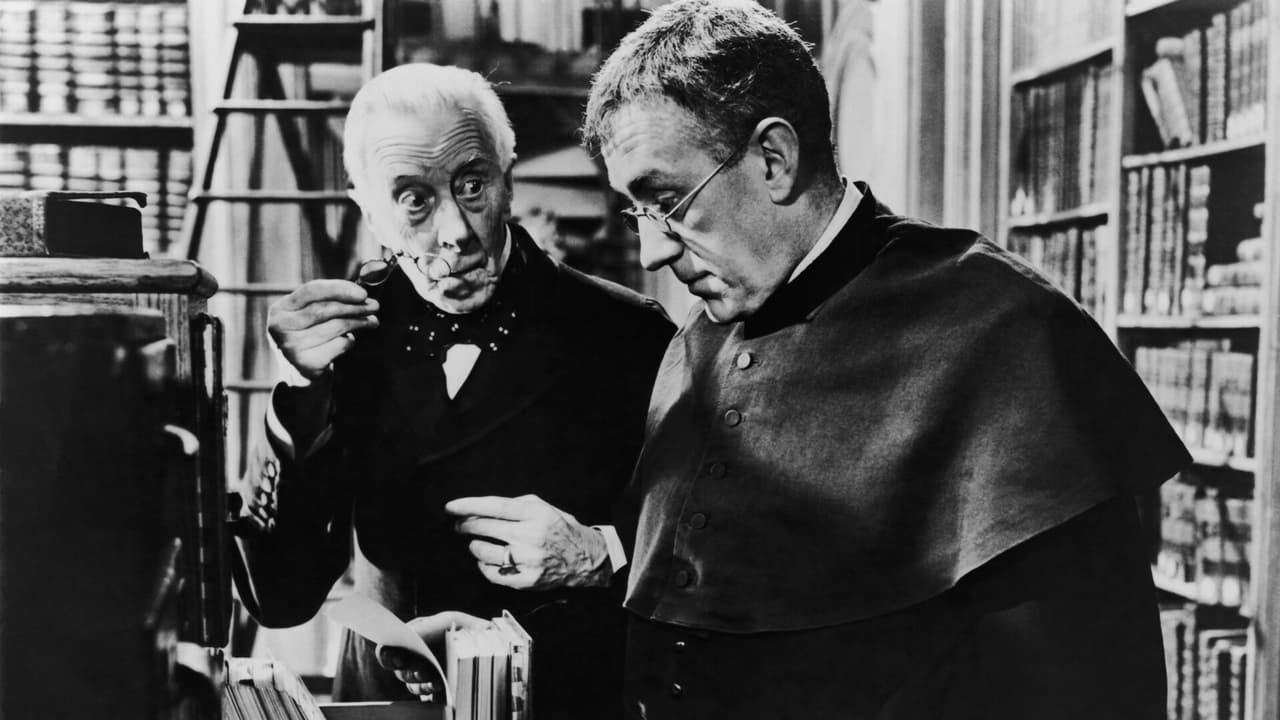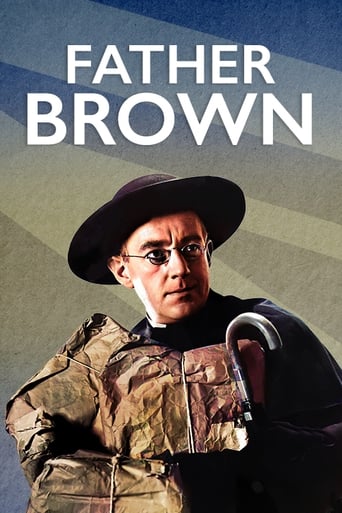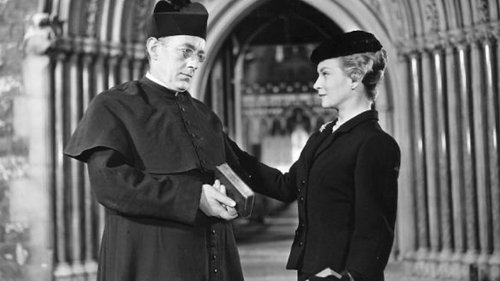


Let's be realistic.
... View MoreGreat movie! If you want to be entertained and have a few good laughs, see this movie. The music is also very good,
... View MoreIt is a whirlwind of delight --- attractive actors, stunning couture, spectacular sets and outrageous parties.
... View MoreThis is ultimately a movie about the very bad things that can happen when we don't address our unease, when we just try to brush it off, whether that's to fit in or to preserve our self-image.
... View MoreFather Brown is an unusual Priest. He tries to get people back on the right track that have sinned and gone a stray.He does this by undoing the crimes they have committed like stealing. He will return the stolen items.He has a Cross that is likely to be stolen by a crook no one can identify. Father Brown is out to find that crook and bring him back to Christ.Some of the story takes place in church to me it is very inspirational. He explains what most people do not know is that he hears the confessions of a lot of different kinds of people and he wants them to repent and come back to God.It is heart warming to hear Scripture and also the stories of the bad people he meets and then tells them they don't have to be the way they are.This is one movie where they are not mocking Priest, Catholics or those who believe in God. Funny and inspirational.You can see it on Youtube. Father Brown The Detective 1954 (Alec Guiness) http://www.youtube.com/watch?v=4gqwXeHI85A
... View MoreAlec Guiness is Father Brown, an English priest transporting an historic cross of St. Augustine to an exhibit in Paris. He's outwitted by the famous and thoroughly civilized thief Gustave Flambeau (Peter Finch). Guiness is on the track of Finch, just as the police and the church are now on the track of Guiness for obstruction of justice or something. He won't cooperate with the cops because he's as interested in Finch as he is in the cross. He's intent on convincing Finch that there's more to life than wallowing in a private art collection that no one else will ever see.It isn't really a comedy in any strict sense. There are two genuinely funny scenes. One is a farcical auction at which Finch makes off with a chess set attributed to Benvenuto Cellini. The other is set in an ancient library of heraldry with Brown and the decrepit caretaker stepping on each other's eye glasses. And they really ARE funny.The challenges facing Father Brown are (1) how to recover the cross and (2) how to ignite the spiritual side of Peter Finch.There is some banter about number two and although it's not exactly a laff riot or a theological disquisition it does carry a bit of weight because of the understated way that Guiness's role is written and the way it's played. I'll give one example. In his private gallery, Finch has been bragging about his collection, while Guiness has expressed not much more than pity for him for not sharing his El Grecos with the rest of the world. As a disappointed Guiness is leaving, Finch says something like: "Here, you forgot your cross." "It isn't mine," replies a glum Guiness. No particular point is made of the exchange. It just encapsulates the two conflicting points of view that the pair have just been discussing.Guiness doesn't go overboard with the role of the priest. He wears a Barry Fitzgerald smile without quite turning the character into a cartoon.The story itself does a good job of evoking G. K. Chesterton, to the extent that that counts. Chesterton's Father Brown was a recedent figure. Chesterton was an ardent Catholic convert and an aesthete. Some of his stories practically dispense with the mystery entirely and turn into rather long criticisms of barbaric art in the form of an Algerian dagger or something. If Chesterton were alive today and an animist, he might be an avid reader of somebody like Joseph Campbell.
... View MoreI had always wanted to catch this classic British film, but it hasn't been shown in my neck of the woods since the early 1980s! As a matter of fact, some time ago I purchased "The Complete Father Brown" volume - collecting all the stories of the sleuthing cleric by G.K. Chesterton, just because I didn't think I was ever going to watch it! Though the character has been featured in at least one other film (in 1934) and several TV adaptations (one starring Kenneth More and another, made in Italy, directed by Vittorio Cottafavi and featuring Renato Rascel), Hamer's version remains the most substantial outing of Chesterton's creation.The film itself, featuring a superbly witty script and deft direction, is a thoroughly delightful and occasionally hilarious gem - made by and with several exponents of the famed Ealing style, it's admirably served by a splendid cast. Alec Guinness is at somewhere near his best in the title role (unassuming, accident-prone but uncommonly shrewd and entirely amiable, his influence on future Peter Sellers characterizations - such as the priest in HEAVENS ABOVE! (1963) and Inspector Clouseau - is very evident); Joan Greenwood is somewhat underused here, but she's quite good as an aristocratic widow and Father Brown's confidante; a young Peter Finch impresses as the gentleman thief Flambeau, engaged in a battle-of-wits with Guinness throughout in which the two clearly respect and admire one another - but the rogue is averse to the priest's attempts to redeem him! Other familiar - and welcome - British faces grace the supporting line-up: Bernard Lee as a cop; Sid James as a ne'er-do-well small-time crook; Cecil Parker as Guinness' flustered superior, a bishop; and Ernest Thesiger as a dotty ancient librarian who appears in only one scene, but it turns out to be one of the film's comic highlights. Other memorable moments involve the various disguises Flambeau adopts in his attempts to outwit Guinness, such as in the lengthy catacombs and auction sequences.Despite Hamer's reputation, this particular film seems to have been somewhat neglected - or, at least, has had its importance downplayed - over the years; in my opinion, along with KIND HEARTS AND CORONETS (1949; undeniably his masterpiece) and IT ALWAYS RAINS ON Sunday (1947; which I only first watched a couple of months back), it stands as the director's finest work. At the time, it was deemed worthy of representing Britain at that year's Venice Film Festival, where it competed against such cinematic heavyweights as Federico Fellini's LA STRADA, Elia Kazan's ON THE WATERFRONT, Akira Kurosawa's SEVEN SAMURAI, Kenji Mizoguchi's SANSHO THE BAILIFF and Luchino Visconti's SENSO - except that Renato Castellani's little-seen version of ROMEO AND JULIET (featuring Laurence Harvey) emerged the overall winner!! FATHER BROWN was also Robert Hamer's second of four collaborations with star Alec Guinness: I own THE SCAPEGOAT (1959), an interesting film co-starring Bette Davis, on VHS and had watched it many years ago; however, I missed out on TO Paris, WITH LOVE (1954) - which, by all accounts, is a disappointing trifle and easily the least of their films together. A side-note regarding Guinness: according to the IMDb, he actually converted to Roman Catholicism soon after the release of FATHER BROWN!
... View MoreOf all the names in the pantheon of great literary detectives, G. K. Chesterton's Father Brown is easily the most overlooked. The character has appeared in only a handful of films and a 13 episode television series in the early seventies. Of the films, The Detective(US title) is the best. Alec Guinness plays the affable cleric with an insatiable appetite for puzzles very nicely. Guinness shows us the heart and dedication Father Brown has to his calling spiritually over any temporal considerations. He also shows us that Father Brown is a character with depth as he takes lessons in karate and truly learns what the lives of his less than well-off parishioners are like. The heart of this film is Gunness's subtle comedic performance as a man challenging himself to catch a thief named Flambeau in the act of stealing his own church's cross that belonged to St. Augustine. Father Brown wants to save the soul of this man as well as the cross. The cat and mouse game between the two is fun fluff, and is vastly entertaining as that rather than a true mystery. Flambeau is played by a very young Peter Finch with class and style.The film boasts a fine array of British character actors with the likes of Bernard Lee(M from James Bond fame), Cecil Parker(King Roderick from The Court Jester and more), Joan Greenwood(Kind Hearts and Coronets), and my personal favourite, Ernest Thesiger from The Bride of Frankenstein. Thesiger has little screen time yet is very amusing in his role. A nice little mystery once again showcasing the comedic talent of one of our century's best actors...Sir Alec Guinness.
... View More